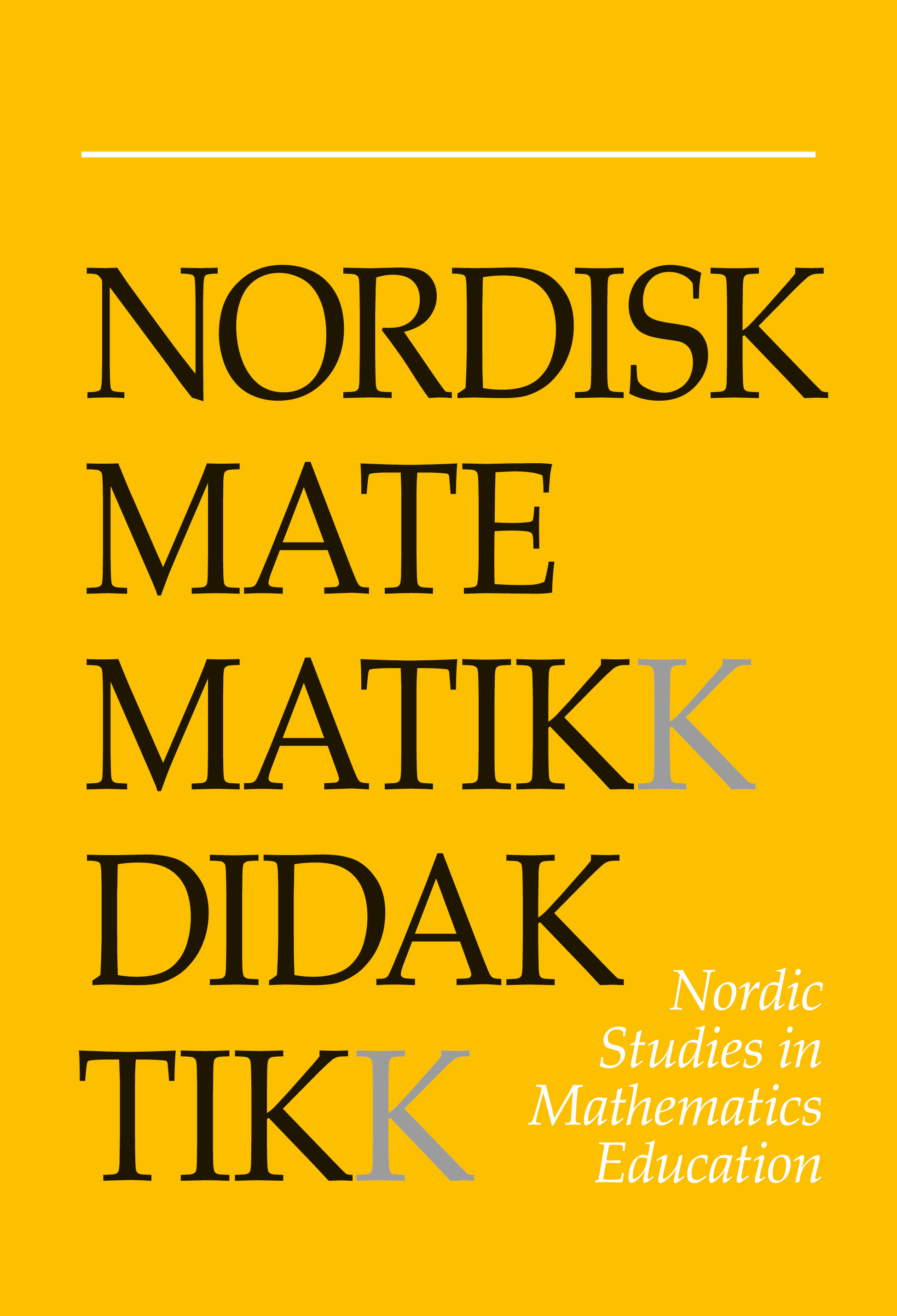Engagement with task context of applications tasks: student performance and teacher beliefs
DOI:
https://doi.org/10.7146/nomad.v6i3-4.146651Abstract
This study investigated the impact of engagement with the task context by upper secondary students on their performance on applications tasks and teacher beliefs about the effects of students' engagement with task context. Moderate to high engagement with a task context was not often associated with poor performance which was more likely to be associated with no to low engagement. High engagement with task context was not a necessary condition for success as the degree of engagement necessary for success may be task specific. Engagement with task context alone was not of sufficient explanatory power to account for all the patterns in the data and it is acknowledged other factors need to be considered. Students identified a sense of realism and having an objective to work towards as facilitators of their engaging with task context. Amongst the teachers interviewed, there was support for the following beliefs: (a) students' preferred degree of contextualisation determines whether success is accompanied by engagement with the task context; (b) if the mathematics is not integrated with the task context, students will not engage with the context and will develop the habit of ignoring it; (c) if the two are integrated, students will engage with the task context; (d) the setting of tasks where the context transcends reality is problematic. The last of these was not supported by all teachers, however.
References
Boaler, J. (1993a). Encouraging the transfer o f school' mathematics to the 'real world' through the integration of process and content, context and culture. Educational Studies in Mathematics, 25, 341-373. https://doi.org/10.1007/BF01273906
Boaler, J. (1993b). The role of contexts in the mathematics classroom: Do they make mathematics more 'real'?. For the Learning of Mathematics 13(2), 12-17.
Britt, M. S., Irwin, K. C , Ellis, J. A. & Ritchie, G. (1993). Changing mathematics teaching: The case of Christine Brown. In B. Atweh, C. Kanes, M. Carss & G. Booker (Eds.) Contexts in Mathematics Education, Proceedings of the 16th Annual Conference of the Mathematics Education Research Group of Australasia. Brisbane.
Brodie, R. & Swift, S. (1993). Q Maths 11B. Melbourne: Moreton Bay Press.
Burton, L. (1993). Implications of constructivism for achievement in mathematics. In J. A. Malone & P. C. S. Taylor (Eds.) Constructivist Interpretations of Teaching and Learning Mathematics. Perth: Curtin University of Technology.
Christiansen, I. (1997). When negotiation of meaning is also negotiation of task. Educational Studies in Mathematics, 34, 1-25. https://doi.org/10.1023/A:1002944413332
Clarke, D. & Helme, S. (1993). Context as construct. Paper presented at the 16th Annual Conference of the Mathematics Education Research Group of Australasia. Brisbane.
Cooney, T. J., Shealy, B. E., & Arvold, B. (1998). Conceptualizing belief structures of preservice secondary mathematics teachers. Journal for Research in Mathematics Education, 29(3), 306-333. https://doi.org/10.2307/749792
Gravemeijer, K. P. E. (1994). Developing Realistic Mathematics Education. Utrecht: CDB Press.
Hung, D. W. L. (1997). Meanings, contexts, and mathematical thinking: the meaning- context model. Journal of mathematical Behaviour, 16(4), 311-324. https://doi.org/10.1016/S0732-3123(97)90010-9
Jacobs, J. K., Yoshida, M , Stigler, J. W. & Fernandez, C. (1997). Japanese and American teachers' evaluations of mathematics lessons: A new technique for exploring beliefs. Journal of Mathematical Behaviour, 16(1), 7-24. https://doi.org/10.1016/S0732-3123(97)90004-3
Klaoudatos, N. (1994). Modelling-orientated teaching (a theoretical development for teaching mathematics through the modelling process). International Journal of Mathematics Education, Science and Technology, 25(1), 69-79. https://doi.org/10.1080/0020739940250109
Lamon, S.J. (in press) Algebra, modelling, and achievement. In P. Galbraith, W. Blum, G. Booker & I. Huntley (Eds.) Mathematical Modelling: Teaching and Assessing in a TechnologyRich World. Chichester: Albion Publishing.
Lave, J. (1988). Cognition in Practice. Cambridge: Cambridge University Press. https://doi.org/10.1017/CBO9780511609268
Miles, M. B. & Huberman, A. M. (1994). An Expanded Source book: Qualitative Data Analysis (2nd ed.). Thousand Oaks, CA.: Sage.
Noss, R. & Hoyles, C. (1996a). The visibility of meanings: Modelling the mathematics of banking. International Journal of Computers for Mathematical Learning 1(1), 3-31. https://doi.org/10.1007/BF00191470
Noss, R. & Hoyles, C. (1996b). Windows on Mathematical Meanings: Learning Cultures and Computers. Dordrecht: Kluwer. https://doi.org/10.1007/978-94-009-1696-8
Pajares, M. F. (1992). Teachers' beliefs and educational research: Cleaning up a messy construct. Review of Educational Research 62, 307-332. https://doi.org/10.3102/00346543062003307
Prawat, R. S. (1992). Are changes in views about mathematics teaching sufficient? The case of a fifth-grade teacher. The Elementary School Journal 93(2), 195-211. https://doi.org/10.1086/461722
Qualitative Solutions and Research (1997). Non-numerical Unstructured Data • Indexing Searching and Theorizing (NUD.IST) (Version 4) [Computer Software]. Melbourne: Author.
Queensland Board of Senior Secondary School Studies: 1992, Senior Mathematics B Syllabus. Brisbane: Author.
Smith, D. N. (1996). Mathematical modelling, Teaching Mathematics and Its Applications 15(1), 37-41. https://doi.org/10.1093/teamat/15.1.37
Smith, R. & Hurst, J. (1990). Accident investigations in I.D. Huntley and D.J.G. James (Eds.) Mathematical Modelling: A Source Book of Case Studies. Oxford: Oxford University Press.
Stillman, G. (In press). The emperor's new clothes? Teaching and assessment of mathematical applications at the senior secondary level. In P. Galbraith, W. Blum, G. Booker & I. Huntley (Eds.) Mathematical Modelling: Teaching and Assessing in a Technology Rich World. Chichester, UK: Albion Publishing.
Strauss, A. L. (1987). Qualitative Analysis for Social Scientists. Cambridge, MA: Cambridge University Press. https://doi.org/10.1017/CBO9780511557842
Tesch, R. (1990). Qualitative Research: Analysis Types and Software Tools. New York: Falmer.
Thompson, A. G. (1992). Teachers' beliefs and conceptions: A synthesis of the research. In D. A. Grouws (Ed.) Handbook of Research on Mathematics Teaching and Learning (pp. 127-146). New York: MacMillan.
Van Zoest, L. R., Jones, G. A. & Thornton, C. A. (1994). Beliefs about mathematics teaching held by pre-service teachers involved in a first grade mentorship program. Mathematics Education Research Journal 6(1), 37-55. https://doi.org/10.1007/BF03217261
Verstappen, P. (1991). Easier Theorized than Done. Enschede: Dutch National Institute for Curriculum Development.
Verstappen, P. (1994). Theory in practice? The dogma: from the everyday world to the mathematical world. Proceedings of the 5th SCTP Conference, Grado, Italy.
Downloads
Published
How to Cite
Issue
Section
License

This work is licensed under a Creative Commons Attribution-NonCommercial-ShareAlike 4.0 International License.



